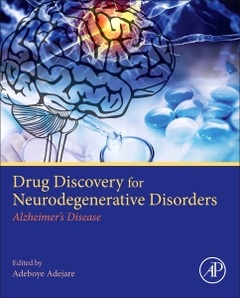Drug Discovery Approaches for the Treatment of Neurodegenerative Disorders Alzheimer's Disease
Coordonnateur : Adejare Adeboye

Drug Discovery Approaches for the Treatment of Neurodegenerative Disorders: Alzheimer?s Disease examines the drug discovery process for neurodegenerative diseases by focusing specifically on Alzheimer?s Disease and illustrating the paradigm necessary to ensure future research and treatment success.
The book explores diagnosis, epidemiology, drug discovery strategies, current therapeutics, and much more to provide a holistic approach to the discovery, development, and treatment of Alzheimer?s Disease. Through its coverage of the latest research in targeted drug design, preclinical studies, and mouse and rat models, the book is a must-have resource for all pharmaceutical scientists, pharmacologists, neuroscientists, and clinical researchers working in this area. It illustrates why these drugs tend to fail at the clinical stage, and examines Alzheimer?s Disease within the overall context of improving the drug discovery process for the treatment of other neurodegenerative disorders.
1. General description of neurodegenerative disorders 2. Alzheimer’s disease diagnosis 3. National plan and resources to address Alzheimer’s disease 4. Current Medications for Treatment of Alzheimer's Disease: Acetylcholine esterase inhibitors and NMDA receptor antagonist 5. Physicochemical properties for potential AD drugs 6. Receptor approaches 7. Amyloid hypothesis 8. Tau proteins 9. Cholesterol and fat metabolism 10. Energy Metabolism 11. Simple in vivo models of Neurodegeneration (C. Elegans, fruitfly, and similar models) 12. Rodent Models 13. Clinical Trials 14. Non-pharmacologic Treatment Approaches
Dr. Adejare is the editor of Drug Discovery Approaches for the Treatment of Neurodegenerative Disorders: Alzheimer’s Disease which is also published by Elsevier.
- Provides a compilation of chemical considerations required in drug discovery for the treatment of neurodegenerative disorders
- Examines different classes of compounds currently being used in discovery and development stages
- Explores in vitro and in vivo models with respect to their ability to translate these models to human conditions
- Distills the most significant information across multiple areas of Alzheimer’s disease research to provide a single, comprehensive, and balanced resource
Date de parution : 10-2016
Ouvrage de 316 p.
19x23.3 cm
Disponible chez l'éditeur (délai d'approvisionnement : 14 jours).
Prix indicatif 120,27 €
Ajouter au panierThèmes de Drug Discovery Approaches for the Treatment of... :
Mots-clés :
(A�) plaques; Preclinical AD; A� A�Alzheimer's disease; Acetylcholinesterase inhibitor; AChEIs; ADME parameters; aggregation inhibitor; Alpha secretase activator; Alzheimer's advisory services; Alzheimer's disease (AD)Amyloid precursor protein (APP)Excitotoxicity; Alzheimer's disease (AD)Amyotrophic lateral sclerosis (ALS)Huntington's disease (HD)Neurodegeneration; Alzheimer's disease (AD)Clinical Dementia Rating Scale (CDR)Dementia Severity Rating Scale (DSRS)Mild cognitive impairment (MCI); Alzheimer's disease education; Alzheimer's disease prevention; Alzheimer's disease; Amyloid beta; Amyloid related; Amyloid-� Anticholinergic; Behavioral and psychological symptoms of dementia; Behavioral symptoms; Benzodiazepines; Beta secretase inhibitor; Blood�brain barrier; BPSD; Caenorhabditis elegans; ChEI; Clinical trials; CNS bioavailability; Cocktail therapies; Cognitive reserve; Contextual fear conditioning; CypD; Danio rerio; Drosophila melanogaster; Drug development; Drug research; Dystrophic neurites; Fruit fly; Gamma secretase inhibitor; Gamma secretase modulator; Glutamate receptors; GPCRs; hPreP; immunotherapy; Lipidomics; Lipophilicity; Memantine; Mitochondrial dysfunction; Morris water maze; Naked mole rat; National Plan; Nematode; Neuronal death; Neuropsychiatric symptoms; NIH meetings; NMDA receptor antagonist; NMDA receptors; NMDA; Nonpharmacological interventions; Parkinson's disease (PD)Pharmacotherapy; Phosphorylation; Physicochemical properties; Polypharmacology; Polypharmacy; Presenilin; Probable AD; Reactive oxygen species (ROS)Presequence peptide accumulation; Rivastigmine; Rodent models; Small molecule; Swedish mutation; Synaptic failure; Synaptic plasticity; Target types; Tau; Therapy types; Treatment candidates; Zebrafish



